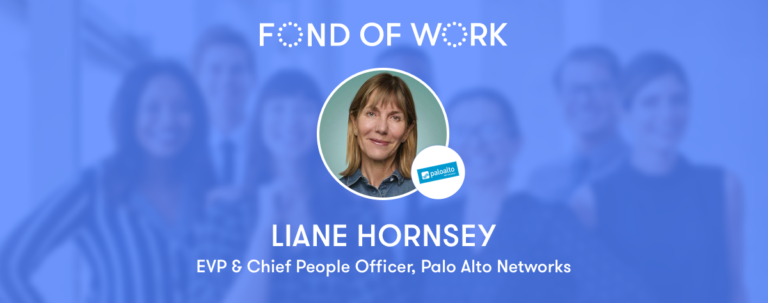
This time for Fond of work, we spoke with Liane Hornsey at Palo Alto Networks, a leader in global cybersecurity protecting billions of people worldwide. Previous to Palo Alto Networks, Liane served as Chief Administrative Officer and Operating Partner at Japan-based SoftBank and Senior Vice President and Chief People Officer at Uber. She has also led people operations for Google and became the company’s first female Vice President in Human Resources.
Learn more about her journey below:
How did you first get into the HR space?
Unwillingly. I was working in the music business, and my boss, who was the CEO at the time, thought that it would be a very good development move for me. At the time, I didn’t agree with him. I had always worked in strategy and P&L roles. But over time, I came to realize that it was an amazing role, and I loved it, and I’ve stayed in HR or people ever since.
How did you end up at Palo Alto Networks?
I worked with Palo Alto Networks’ current CEO at Google, and he contacted me and asked me to interview for the position. I didn’t know the company at the time but after meeting the executive team and understanding a little about the company mission and culture I was really excited. I was super impressed by how mission-driven everyone seemed. It was also a learning opportunity as I have not worked in enterprise companies for a long time!
 Why are you fond of what you do for Palo Alto Networks?
Why are you fond of what you do for Palo Alto Networks?
Many reasons. One, I actually think that when you’re in the people space, you see so much more of the business than many other functions because you have to deal with everybody. It’s intellectually challenging. It’s also challenging because you’re dealing with people and not widgets. I’m interacting with people who have a myriad of views about everything, and so I have to listen hard and think on my feet. I actually also really love the fact that if my team and I get it right we can truly make a difference to how people feel at work. That’s hugely rewarding.
Why do you think HR is an important department for businesses to have?
It’s very clear. No business can be successful unless it’s got the right people doing the right things. You can have the best idea, and if you don’t have people who can execute that idea to the standard you want, you won’t maximize. Every business is dependent on people one way or another. And so one of the things I love about Palo Alto Networks is that the company understands this concept. The people agenda is really upfront and central in every board meeting that I attend. We really do try to get the people agenda right.
What’s your management philosophy, and how do you apply it at Palo Alto Networks?
First and foremost, I truly believe good ideas come from everywhere! I think a lot of people say it but they don’t mean it. Every business has a degree of hierarchy, but it’s nonsensical to think the senior people know best. My management philosophy is I build teams made of people who truly believe:
- It’s okay to disagree with me
- It’s okay to disagree with each other
- We need to commit to what we agree together
 I believe that you should have a very open debate and that the best results come from having a diverse team. I don’t just mean in terms of gender and/or underrepresented minorities — I also mean in terms of age, in terms of background, or in terms of companies that people come from. You put people with different perspectives together and you set them free so they can truly discuss and ideate, then you watch magic happen. If you don’t do that, you carry on doing the same thing and you are less likely to innovate. I would also like to think that I encourage an environment where people can openly voice their opinions and know they will be supported. It’s so important to ensure that everyone believes that they genuinely matter. At the end of the day, there is nothing more exciting to me than working with a genuine team — it’s a total joy.
I believe that you should have a very open debate and that the best results come from having a diverse team. I don’t just mean in terms of gender and/or underrepresented minorities — I also mean in terms of age, in terms of background, or in terms of companies that people come from. You put people with different perspectives together and you set them free so they can truly discuss and ideate, then you watch magic happen. If you don’t do that, you carry on doing the same thing and you are less likely to innovate. I would also like to think that I encourage an environment where people can openly voice their opinions and know they will be supported. It’s so important to ensure that everyone believes that they genuinely matter. At the end of the day, there is nothing more exciting to me than working with a genuine team — it’s a total joy.
How do you define diversity and inclusion, and how does Palo Alto Networks work toward that?
Inclusion is actually one of our core values, and it’s something we take really seriously. I think there is a danger that companies can be a little narrow in their interpretation of diversity. Great companies genuinely welcome people with differing life experiences and nurture those people so that they truly feel a strong sense of belonging. It’s one thing to have a diverse workforce, and it’s another to actually ensure everyone feels included. For companies and individuals to thrive, we really must create the conditions where everyone feels encouraged and supported. Much of our approach is led by our people — particularly those who lead our ENGs. They do an absolutely amazing job of ensuring we create an inclusive environment.
 Why do you think employee recognition matters in the workplace?
Why do you think employee recognition matters in the workplace?
It’s very simple. Everybody wants to feel good about themselves. I don’t come to work for my boss to tell me off. I come to work for my boss to tell me I’m doing a good job and to pat me on the back. There’s nobody in this world who doesn’t want to feel good about themselves. We work for eight hours a day or more, sometimes. We should have fun and feel as though we are making a difference.
How do you reward and recognize employees at Palo Alto Networks?
Many different ways. We have bonus and recognition schemes based on our values. We have all sorts of formal mechanisms. The one thing that really matters is that it’s specific. My philosophy and my true belief is if I’m really respectful of you, I’m going to be very specific to you, and I’m not going to be generic. I’m really going to think about you as an individual and what’s meaningful for you, and that’s what good recognition is all about.
 It’s also important to remember that it’s different for different people. You know some people like to be recognized publicly, and some others really don’t. Some people want to be recognized with money, and some others less so. So, you must show people the respect of getting to know them to know what’s meaningful to them. Authenticity is everything.
It’s also important to remember that it’s different for different people. You know some people like to be recognized publicly, and some others really don’t. Some people want to be recognized with money, and some others less so. So, you must show people the respect of getting to know them to know what’s meaningful to them. Authenticity is everything.
What’s the best advice you’ve received in your career?
I think the best advice I’ve received in my career is “to assume good intent.” Eric Schmit at Google used to always say, “Always assume good intent until proven otherwise.”
Be kind, be compassionate, and listen. Don’t automatically put people down. Start in a good place when you’re talking to people. I think that’s really meaningful. It changes your whole happiness at work as well.
 What are some of the most pressing issues HR leaders face today?
What are some of the most pressing issues HR leaders face today?
Everything is changing rapidly. There’s always been change, but the momentum is so significant that people constantly need support without information overload. Personalized learning is super critical.
What is one thing you’ve had to learn the hard way in your career?
If you really find it hard to respect your manager, at some point you should cut the cord. There’s nothing worse than working for someone where there is no mutual respect, and it usually goes two ways. If you don’t respect that person, they often don’t respect you. It becomes very debilitating, it becomes very sad, and it’s unnecessary because you should always find a manager that supports you and genuinely wants you to thrive.
What is one of Palo Alto Networks’ core values, and how do you practice it every day?
Well, we have five core values, and I’m very proud of them because we crowdsourced them. We asked all 7,000 of our employees to come up with words which are meaningful to them and then vote on them. I’m very proud of our values because they’re ours — they weren’t written by the executives. They were written by every single employee.
 It’s impossible to have a favorite because we have five, and I love them all, but I think the thing that really captures our company is “collaboration.” People genuinely want to work together to solve very significant big problems around cyber security. People are very driven by the fact that we’re working for something that’s very meaningful.
It’s impossible to have a favorite because we have five, and I love them all, but I think the thing that really captures our company is “collaboration.” People genuinely want to work together to solve very significant big problems around cyber security. People are very driven by the fact that we’re working for something that’s very meaningful.
I think that the thing that really matters to me is collaboration, and you achieve it by:
- Assuming good intent
- Deeply listening to people
You have to make sure that you’re not talking but listening and building on each other’s point of view, and you’re doing it genuinely in a way where people feel it together. Everybody needs to feel that they add value. When you listen and you really collaborate, people feel valued.
Do you have any advice for future HR leaders?
I think a lot of HR people make the assumption that they can go from one company to the next and take their learning with them. Every company is different. A solution that I would have used at Google is not the same as what I would have used at Uber, or Softbank, or Palo Alto Networks. Making the assumption that you can take the same solution from one business to the next isn’t wise because companies are in different stages of growth. They have different cultural issues and different priorities.
Thanks so much to Liane for taking the time to speak with us. Palo Alto Networks is hiring, so check out their website to learn more. And, of course, stay tuned for the next interview in the Fond of Work series!
Fond is a global SaaS platform that seamlessly consolidates employee rewards and recognition processes into one easy-to-use solution. For more information on how Fond can help you, request a demo today!
 Why are you fond of what you do for Palo Alto Networks?
Why are you fond of what you do for Palo Alto Networks? Why do you think employee recognition matters in the workplace?
Why do you think employee recognition matters in the workplace? What are some of the most pressing issues HR leaders face today?
What are some of the most pressing issues HR leaders face today?